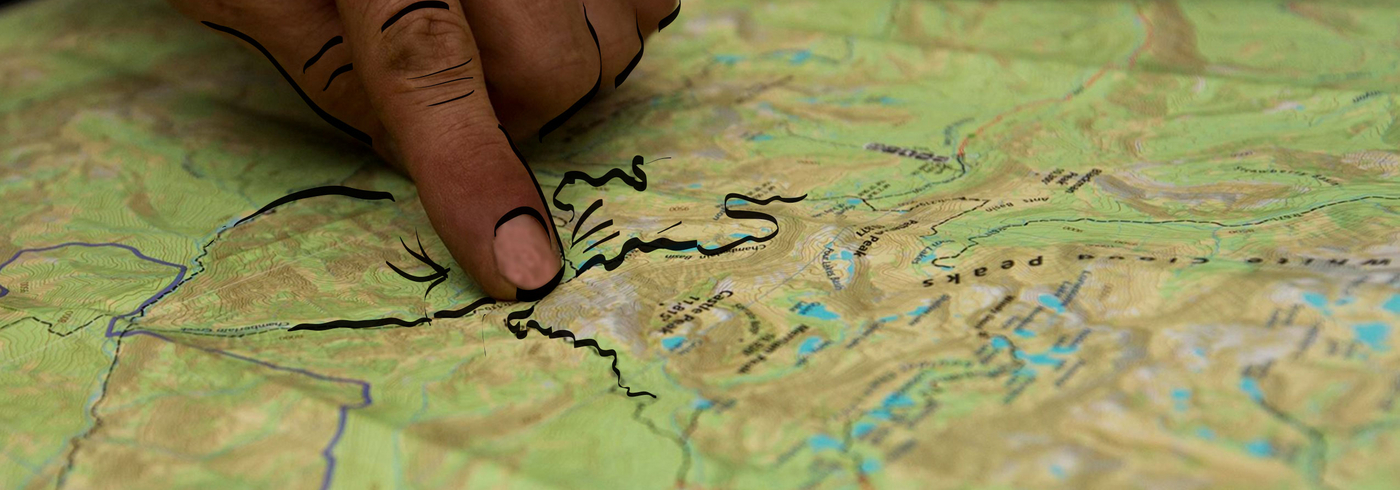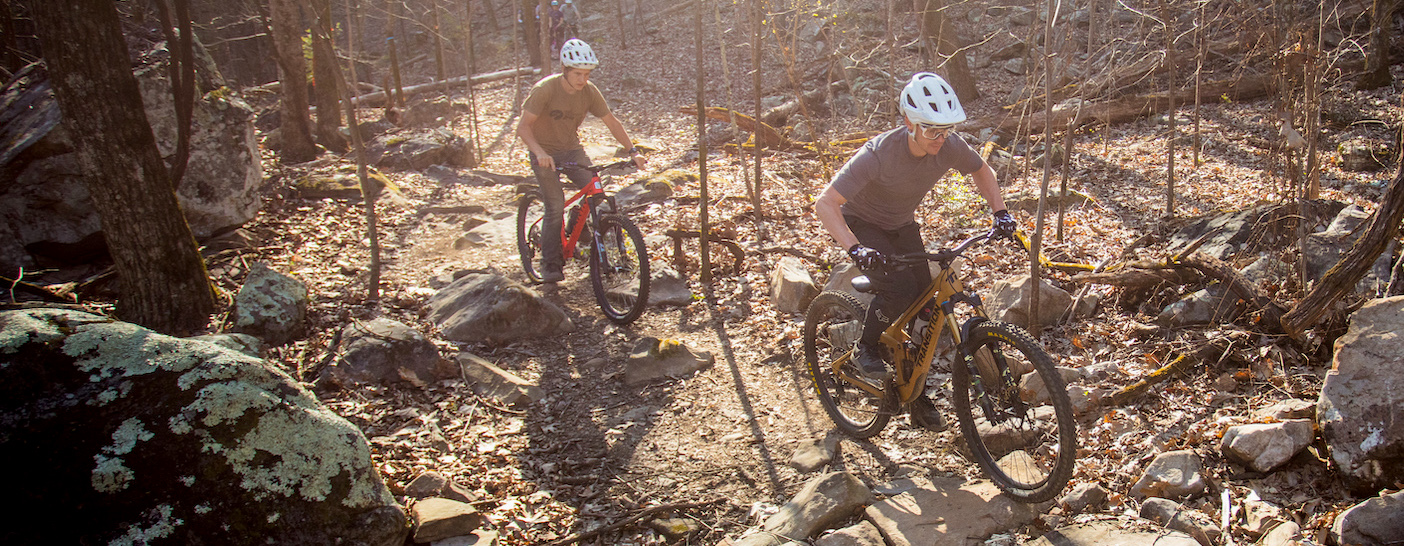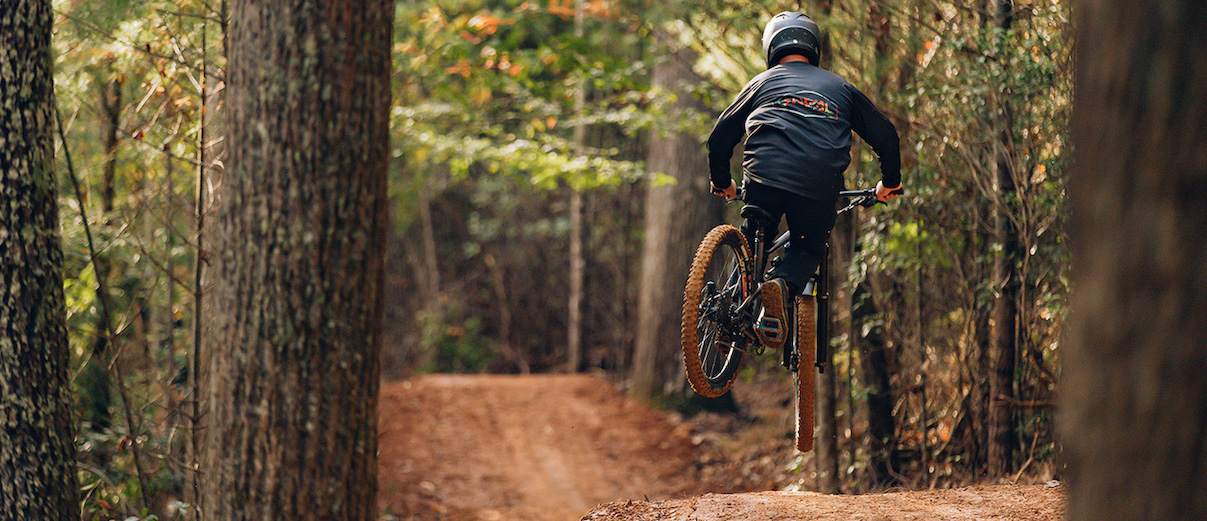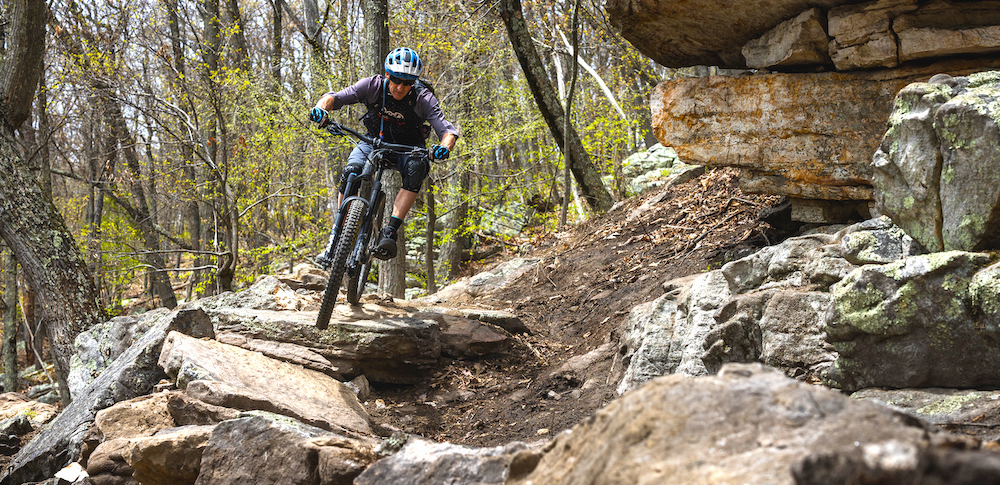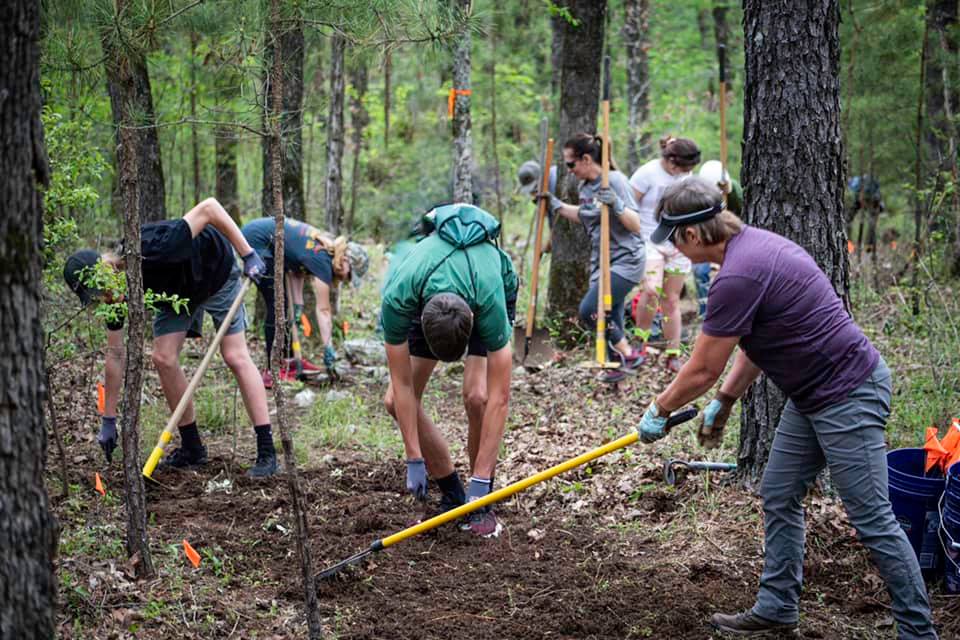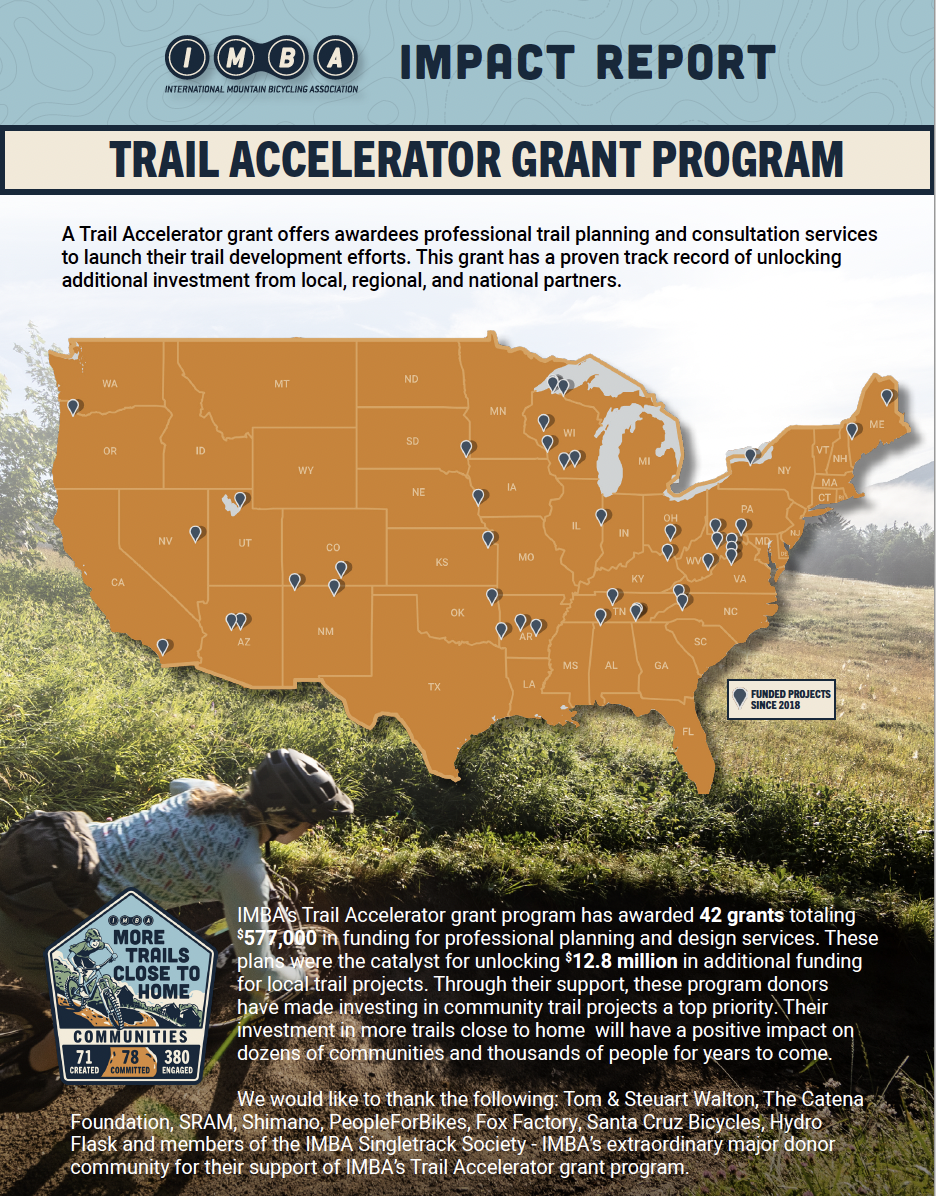2025 Spring Grant Round
To grow the quantity and quality of mountain bike trail communities, we need to accelerate the pace of trail building. Trail Accelerator Grants provide a jump-start to communities that have the interest and political support to develop trail systems but need assistance to get projects up and running, or need further education and resources along the way.
New for 2025, the Trail Accelerator Grant will have two grant rounds, with each round focusing on different aspects of trail development.
The spring grant window will award professional trail planning and design consultation services. Planning is a key first step in trail development that sets the stage for all future work while often leveraging additional investment from local, regional, and national partners.
Meanwhile, the fall round of grants will provide educational support through our other programs: Trail Care Schools, Trail Management Schools, Trail Accelerator Workshops, and funding/capital campaign education.
Bringing Trails Close to Home
The first round of the 2025 Trail Accelerator Grant will open on March 1 and close on April 30, specifically for projects needing planning and design services. For help in preparing your best application for this round, check out the Applicant Toolkit.
Stay tuned for the fall timeline for round two.
Need more information?
Scroll below for more information and important FAQ for the Spring 2025 grant round. For planning and design projects, you can view our applicant toolkit to help you prepare for the applications.
Email Marty Caivano with any questions not answered below.
Bringing More Trails Close to Home
118 projects, 42 grants awarded, $577,000 leveraged to become $12.8 million for local trails.
IMBA Trail Accelerator Grants In Detail
Round 1 - Spring 2025 Planning and Design:
Grants awards typically range from $10,000-$30,000, and this is a one-to-one matching grant. For example, if you are awarded a $10,000 grant, you are required to match that with $10,000, for a total project cost of $20,000. If you are awarded a $30,000 grant, you are required to match that with $30,000 for a total project cost of $60,000. To determine the specific grant amounts, finalists will receive a call from IMBA Trail Solutions staff to discuss the scope of work, associated tasks, and define the final deliverables of the potential Trail Accelerator Grant project. This phone call does not indicate that a grant has been awarded. For grant awardees, the agreed-upon trail project process can be different for each site based on the desired outcomes and will be clearly documented in a contract between the applicant and IMBA. Project deliverables may include trails and facility concept plan reports, map graphics, field visit based trail design, and trail advocate education.
What Types of Projects Will Be Considered?
- Projects that will serve mountain bikers as the primary users, though multi-purpose human-powered trail uses are viable as well.
- Projects that will result in a visible and substantial increase in access, improved mountain bike experiences, and greater community benefit.
- Projects where the Trail Accelerator grant stands to leverage additional resources to ensure the success of the project.
- Projects that promote community development, volunteer recruitment, new rider development, youth riding, and engaging under-represented community members.
- Typical project outcomes: Conceptual plans for new or expanded trail networks; detailed design and field flagging of trail alignments; assessment of existing trail networks reviewing trail sustainability, trail improvements, and/or network expansion; community wide feasibility studies analyzing multiple land parcels or large landscapes; planning/design of urban bike parks.
- A declined request does not imply that the project is not needed or valued. Those who do not receive a grant award may apply again in subsequent rounds.
Who Can Apply?
- Local, municipal, state, or federal government agencies, and 501(c)(3) nonprofits that actively manage parks and trails may apply. This can include land managers, chambers of commerce/economic development departments, community health organizations, land trusts/conservancies, etc.
- Mountain bike clubs and IMBA Local Member Organizations with the capacity to match and manage a grant of this scale are eligible to apply. The organization applying must be able to provide the matching funds.
- Projects which are primarily based on private land must be fully open to the public and free of charge.
- Private organizations including ski resorts, HOAs, or property developers are not eligible to apply.
- Religious organizations for religious purposes, private foundations, and political causes/candidates/legislative lobbying groups are not eligible to apply.
Applying for a Grant
Each grant is an award of in-kind professional services from the IMBA Trail Solutions team (with assistance from qualified subcontractors as needed) and requires a one-to-one cash match.
- Applications will be accepted over a two-month period when the next application period is announced.
- All communities interested in applying for a Trail Accelerator grant must submit a completed application. Incomplete applications will not be accepted.
- Calls will be scheduled with leading applicants to further discuss their proposals. If selected for a call, please do not consider this as approval for a grant.
- All awardees will be required to announce the receipt of the grant in a formal press release, on social media outlets, and on the site of the trail project (if applicable) as agency policy permits.
- Due to volume, we cannot give specific feedback on declined proposals.
Frequently Asked Questions
Planning & Design
Why go through a planning process? I just want to start building trails.
- Just like you wouldn’t build a house without an architectural plan, trails need plans, too. A good plan will save you money and mistakes by identifying opportunities and constraints, making the best use of the land, and clearly defining the scope of what you want to do.
- A professional plan is the key to setting foundational next steps in implementing a successful project. From a good plan, smart design follows, and from good design, quality construction goes much more smoothly.
A professional plan is also critical for support, both politically and financially. Once decision makers and funders see a quality trail plan, they are much more inclined to get behind your ideas. Your plan documents are also more likely to impress other granting agencies and get the funding you need to move forward.
What if I don’t know a lot about trail development?
No problem! We are happy to provide the expertise. Our staff can guide you through the application at any point, and if you’re awarded, we’ll help you from start to finish through the planning and design process.
When you say you prioritize projects that focus on broad community engagement what are some examples?
Projects that improve access for:
- Youth programs, NICA teams, women’s programs
- Adaptive riders
- Populations/neighborhoods that currently have no access to trails
- Populations with health challenges
- Any community that has no trails at all
What kind of plans are possible through the grant?
Each project is different, but options could include:
- Assessments of multiple properties to analyze suitability for trail development and priorities among available parcels.
- Concept plans and maps that lay out the desired experiences and outcomes, from large-scale to small site layout on a given property. May include some generalized trail corridors and/or bike-optimized facility concepts; can also indicate preferred phasing and construction approach.
- Design documents and physical trail flagging that lays out more detailed trail corridors and alignments; may include specifics on trail features and experiences.
Is this a cash grant?
No. This grant awards you half the cost of professional planning and design services. You still need to contribute the other 50%.
How do I figure out my project budget, and therefore what my half of the match should be?
Trail Accelerator Grants typically range from $10,000 to $30,000, with an equal match coming from the applicant to reach the total project cost of $20,000 to $60,000.
Every project is unique, based on many factors: the size of the land parcel, the difficulty of the terrain, the level of detail needed in the plan, permitting requirements, the complexity of community engagement required, and so on. We will discuss your project with you as part of the application process, so that together we can work through the project tasks and what they will cost. However, it will be helpful for you to read the information below to estimate what your project might cost.
Concept planning on a moderately sized project site (roughly under 1,000 acres) will fall within a $25k - $45k range for total project budget. If adding in field flagging of trail alignments, the cost will move into the $50k - $75k range.
Here are specific examples to help you visualize how your project might be realized through planning and design. Click the links to read more about the projects, see their concept plans, and learn how the Trail Accelerator Grant was implemented.
Elkins, WV: IMBA assessed 12,000 acres, resulting in a conceptual plan (opens in new tab) for 115 miles of trail and 15 miles of field-flagged design. Total cost was $60,000, with $30,000 matched by the awardee.
Lost River State Park, WV: IMBA reviewed the 3,000-acre park, then narrowed the area of interest to a smaller zone for a brand new trail system specifically for MTB, as well as full access for adaptive riders. The concept plan (opens in new tab) contained 25 miles of trail, and 3 miles were field flagged. Total cost was $35,000, with $17,500 matched by the awardee.
Lawrence, KS: IMBA performed a trails feasibility assessment on a 200 acre site and prepared an assessment and concept plan document that included two concept plan (opens in new tab) alternatives with approximately 5-6 miles as well as a construction cost opinion for both concepts. IMBA also assessed, inventoried and documented existing recreation infrastructure including recommendations for greenway connectivity solutions. Total cost was $25,000, with $15,000 matched by the awardee.
Can this grant be used for construction?
No. This grant is only for planning and design.
If my project is awarded a grant, what happens next?
We work with you to define the final project scope and deliverables, and identify the best time for us to complete desktop tasks, fieldwork, and deliverables. There isn’t a strict or set timeline, but rather what works best for the project, local climate and other factors.
Apply
You must create an account and be logged in to apply for the Trail Accelerator grant. Applications can be saved as drafts and returned to at a later time. Create an Account Here. Applications open March 1, 2025.
Questions about the Trail Accelerator Grant? Connect with us.
